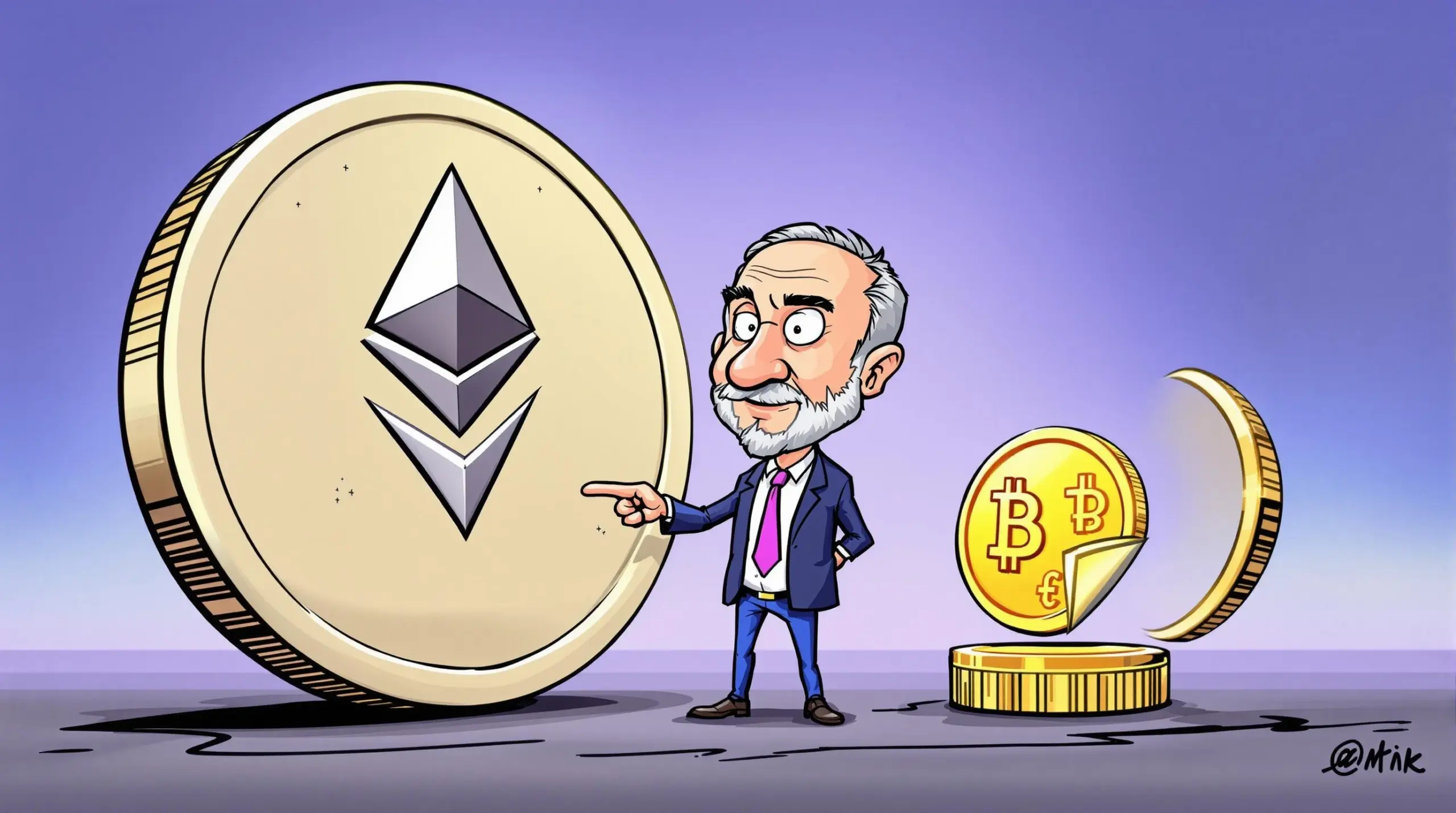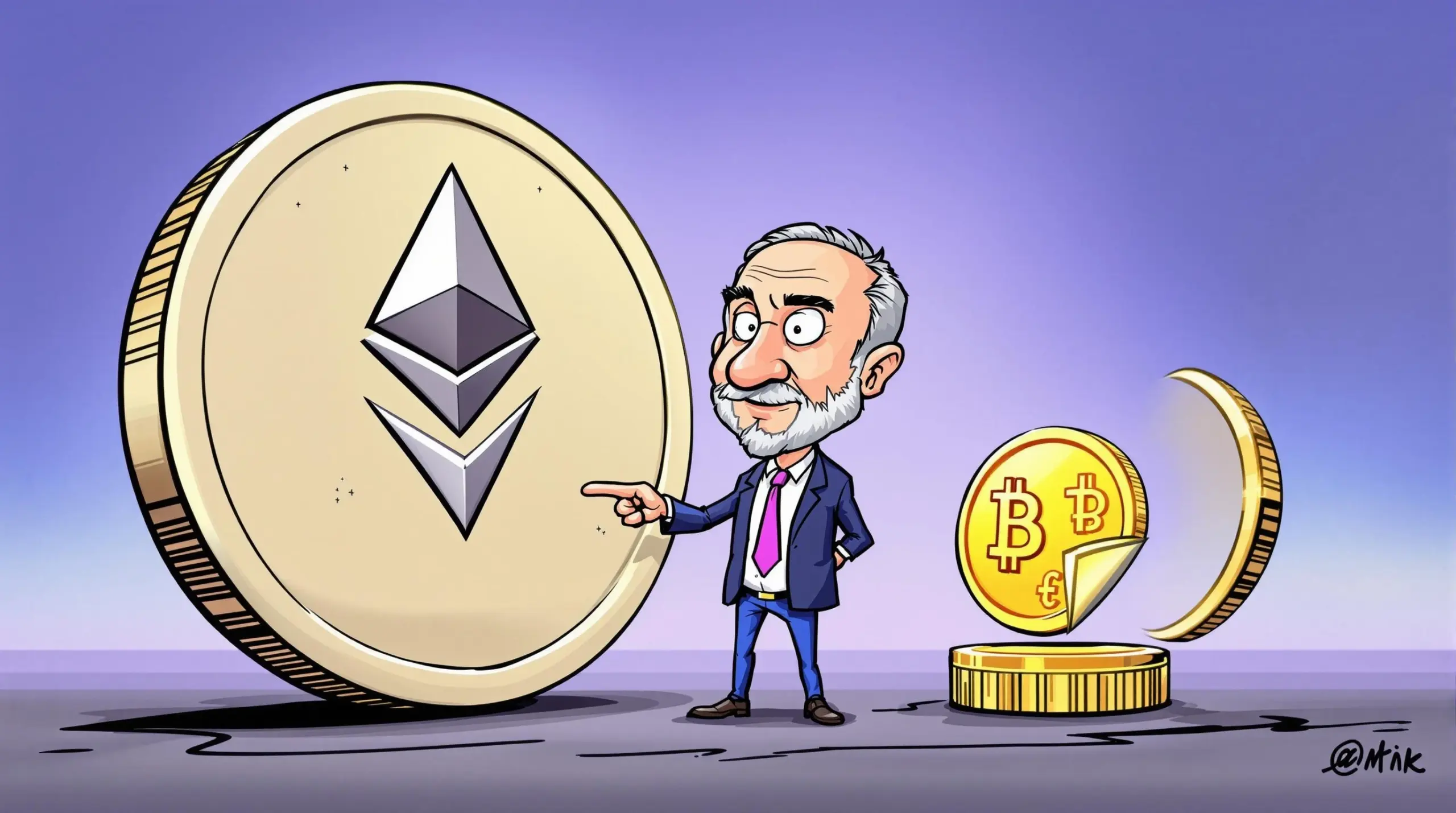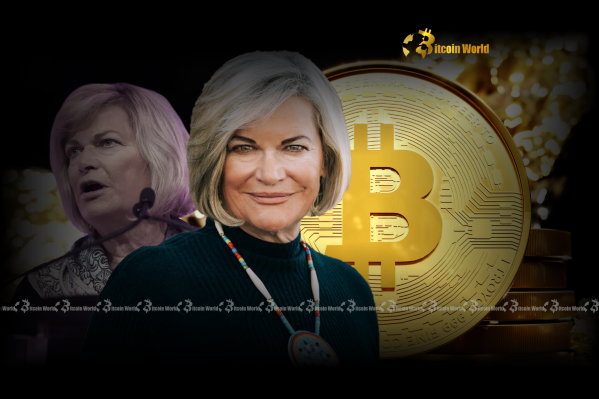BitcoinWorld

Ethereum Bitcoin: Peter Schiff’s Bold Call to Action for Your Portfolio
The world of cryptocurrency is no stranger to bold predictions and surprising takes, especially from figures known for their skepticism towards digital assets. One such voice, Peter Schiff, the staunch gold advocate and CEO of Euro Pacific Capital, recently dropped a bombshell on X, igniting a fresh debate within the crypto community. His advice? Consider an Ethereum Bitcoin trade – specifically, selling your Ether (ETH) to buy Bitcoin (BTC). This unexpected counsel from a long-time crypto critic has sent ripples through the market, prompting investors to re-evaluate their strategies and ponder the underlying reasons behind such a striking recommendation. Could there be a compelling argument for shifting from the second-largest cryptocurrency to the first?
Why the Ethereum Bitcoin Debate Intensifies with Peter Schiff’s Advice?
Peter Schiff is famously known for his unwavering belief in gold as the ultimate store of value and his consistent skepticism regarding cryptocurrencies. For years, he has dismissed Bitcoin and other digital assets as speculative bubbles, destined for collapse. This long-standing stance makes his recent commentary on an Ethereum Bitcoin swap particularly noteworthy and, for many, quite shocking. On X, Schiff stated, “As much as it pains me to say, selling Ether and buying Bitcoin with the proceeds is a better trade than holding Ether.”
His reasoning, while concise, offers a crucial insight into his perspective. He added that “Ether has more acknowledged competition for the narrative of its use case.” This statement highlights a core difference in how Bitcoin and Ethereum are perceived, even by a critic like Schiff. Bitcoin, often dubbed “digital gold,” primarily serves as a decentralized store of value and a medium of exchange. Its narrative is relatively singular and well-established. Ethereum, on the other hand, powers a vast ecosystem of decentralized applications (dApps), NFTs, and decentralized finance (DeFi), constantly evolving and facing new competitors in the smart contract platform space.
Schiff’s observation suggests that while he remains critical of all cryptocurrencies, he sees Bitcoin’s narrative as more robust and less susceptible to disruption compared to Ethereum’s multifaceted and competitive landscape. This doesn’t mean he has become a crypto evangelist; rather, it’s a strategic concession within his overall bearish outlook, implying that if one must hold crypto, Bitcoin might be the “less bad” option. This perspective adds a unique layer to the ongoing Ethereum Bitcoin discussion, urging investors to consider not just technological prowess but also narrative strength and competitive positioning.
Understanding the Ethereum Bitcoin Landscape: A Comparison
To fully grasp the implications of Peter Schiff’s advice, it’s essential to understand the fundamental differences and similarities between Bitcoin and Ethereum. While both are leading cryptocurrencies, their design, purpose, and ecosystems diverge significantly. This comparison is crucial for anyone considering an Ethereum Bitcoin portfolio adjustment.
Here’s a simplified overview:
- Bitcoin (BTC): The Digital Gold
- Primary Purpose: Store of value, peer-to-peer digital cash.
- Technology: Simple blockchain, primarily for transactions.
- Supply: Capped at 21 million coins, creating scarcity.
- Narrative: Decentralized, censorship-resistant, inflation-hedge.
- Competition: Limited direct competition for its “digital gold” narrative.
- Ethereum (ETH): The World Computer
- Primary Purpose: Platform for smart contracts, dApps, DeFi, NFTs.
- Technology: Complex blockchain, Turing-complete, supports a vast ecosystem.
- Supply: No fixed cap, but supply changes with burning mechanisms (EIP-1559) and issuance.
- Narrative: Programmable money, Web3 foundation, innovation hub.
- Competition: Faces significant competition from other Layer 1 blockchains (e.g., Solana, Avalanche, Cardano) for dApp development and user adoption.
Schiff’s point about “acknowledged competition” for Ethereum is valid. While Ethereum holds a dominant position in the smart contract space, it is constantly challenged by newer, often faster and cheaper, blockchains. This competition puts pressure on Ethereum to innovate and scale, leading to developments like the Merge and future sharding upgrades. Bitcoin, by contrast, faces less direct competition in its niche as a decentralized, scarce digital asset. Its narrative as a safe haven or a long-term store of value remains largely unchallenged by other cryptocurrencies, although it does compete with traditional assets like gold.
This fundamental distinction forms the bedrock of Schiff’s surprising recommendation, suggesting that even a crypto skeptic recognizes the different risk profiles inherent in the Ethereum Bitcoin dynamic.
Is an Ethereum Bitcoin Swap Right for You? Actionable Insights
Peter Schiff’s advice to sell ETH and buy BTC is provocative, but is it a universally applicable strategy? The decision to execute an Ethereum Bitcoin swap depends heavily on individual investment goals, risk tolerance, and market outlook. It’s crucial to approach such a decision with careful consideration, not simply by following one expert’s (or skeptic’s) opinion.
Potential Benefits of Selling ETH for BTC:
- Perceived Stability: Bitcoin is often seen as the more stable of the two, especially during market downturns, due to its longer history, larger market capitalization, and established “digital gold” narrative.
- Simpler Use Case: Bitcoin’s singular focus as a store of value might appeal to those seeking a less complex investment in the crypto space.
- Reduced Competition Risk: As Schiff noted, Bitcoin faces less direct competition for its core narrative compared to Ethereum, which constantly battles other smart contract platforms.
- Institutional Adoption: Bitcoin has historically seen more traditional institutional adoption (e.g., spot Bitcoin ETFs), which some investors view as a sign of maturity and stability.
Potential Challenges and Risks of Selling ETH:
- Missing Ethereum’s Growth: Ethereum is a powerhouse of innovation, driving the DeFi, NFT, and Web3 revolutions. Selling ETH could mean missing out on future growth tied to these burgeoning sectors and upcoming network upgrades (like sharding).
- Yield Opportunities: Ethereum offers various yield-generating opportunities through staking (post-Merge) and DeFi protocols, which are generally not available with Bitcoin.
- Network Utility: ETH is not just an asset; it’s the gas fee for the entire Ethereum ecosystem. Its utility is deeply embedded in the functioning of decentralized applications.
- Future Scalability: Ethereum’s roadmap aims to significantly improve its scalability and efficiency, which could further cement its position as a leading smart contract platform.
Actionable Insights for Your Portfolio:
- Assess Your Goals: Are you looking for long-term store of value, or do you want exposure to the broader decentralized application ecosystem?
- Diversification: Instead of an “either/or” approach, consider holding both Bitcoin and Ethereum as part of a diversified crypto portfolio. This allows you to benefit from both narratives.
- Risk Tolerance: Understand that all cryptocurrencies carry significant risk. Evaluate if shifting entirely to Bitcoin aligns with your comfort level for volatility.
- Research Beyond Headlines: Don’t make decisions based solely on a single comment. Dive deeper into the fundamentals, technology, and market trends of both assets.
- Consult a Professional: For personalized financial advice, always consult with a qualified financial advisor who can assess your specific situation. This article provides general information and is not financial advice.
Navigating the Future of Ethereum Bitcoin Dynamics
The ongoing dialogue surrounding Ethereum Bitcoin dynamics is a testament to the evolving nature of the cryptocurrency market. Peter Schiff’s recent comments, while controversial, serve as a potent reminder that even long-term skeptics are observing the nuanced differences between these two crypto giants. The future trajectory of both assets will be influenced by a myriad of factors, including technological advancements, regulatory clarity, institutional adoption, and macroeconomic conditions.
For Ethereum, the success of its ongoing upgrades, particularly those aimed at scalability and efficiency, will be paramount. If Ethereum can effectively address its challenges related to transaction costs and speed, its utility as the foundational layer for Web3 could see unprecedented growth. This would strengthen its “use case narrative” against competitors.
Bitcoin, on the other hand, continues to solidify its position as a digital store of value. Its halving cycles, increasing institutional interest, and growing acceptance as a legitimate asset class contribute to its perceived resilience. The narrative of Bitcoin as “sound money” or “digital gold” is becoming increasingly ingrained, potentially attracting more traditional investors seeking an alternative to fiat currencies or even physical gold.
Ultimately, the choice between, or the allocation within, Ethereum Bitcoin in a portfolio comes down to individual conviction and understanding of the distinct roles each asset plays in the broader digital economy. The market is dynamic, and what holds true today may shift tomorrow. Continuous learning and adaptation are key for any investor navigating this exciting yet unpredictable landscape.
In conclusion, Peter Schiff’s unexpected advice to sell Ether for Bitcoin highlights the nuanced perspectives even critics hold regarding the crypto market’s two titans. While Bitcoin is championed for its “digital gold” narrative and perceived stability, Ethereum’s vast ecosystem and ongoing innovation face the challenge of increasing competition. The decision to adjust your Ethereum Bitcoin holdings is a personal one, requiring careful consideration of your financial goals, risk tolerance, and a thorough understanding of each asset’s unique value proposition. Always conduct your own research and consider professional advice before making investment decisions in this volatile space.
Frequently Asked Questions (FAQs)
Q1: Who is Peter Schiff and why is his opinion on crypto significant?
A1: Peter Schiff is a prominent American stockbroker, financial commentator, and staunch advocate for gold. He is widely known for his bearish views on the U.S. dollar and his consistent skepticism towards Bitcoin and other cryptocurrencies. His opinion is significant because he represents a traditional financial perspective, and any shift or nuance in his stance, even a critical one, garners attention from both traditional and crypto investors.
Q2: What did Peter Schiff specifically say about selling ETH and buying BTC?
A2: On X, Peter Schiff stated, “As much as it pains me to say, selling Ether and buying Bitcoin with the proceeds is a better trade than holding Ether.” He further explained that “Ether has more acknowledged competition for the narrative of its use case,” implying Bitcoin’s narrative is more robust.
Q3: What does “acknowledged competition for the narrative of its use case” mean for Ethereum?
A3: This phrase refers to the fact that while Ethereum is a leading smart contract platform, it faces strong competition from other Layer 1 blockchains like Solana, Avalanche, and Cardano, which also aim to host decentralized applications and DeFi. Bitcoin, primarily a store of value, has fewer direct competitors in its core use case.
Q4: Is Peter Schiff’s advice considered financial advice?
A4: No, Peter Schiff’s comments are his personal opinion and should not be considered financial advice. Investment decisions, especially in volatile markets like cryptocurrency, should always be based on individual research, risk assessment, and potentially consultation with a qualified financial advisor.
Q5: Should I sell my Ethereum and buy Bitcoin based on this advice?
A5: The decision to adjust your portfolio, including an Ethereum Bitcoin swap, is highly personal. It depends on your investment goals, risk tolerance, and market outlook. It is crucial to conduct your own thorough research into both assets and consider a diversified approach rather than acting solely on one opinion.
Did you find this analysis of Peter Schiff’s surprising crypto advice insightful? Share this article with your friends and on social media to spark a conversation about the evolving dynamics of Ethereum Bitcoin and the future of cryptocurrency investments!
To learn more about the latest explore our article on key developments shaping Bitcoin price action.
This post Ethereum Bitcoin: Peter Schiff’s Bold Call to Action for Your Portfolio first appeared on BitcoinWorld and is written by Editorial Team





